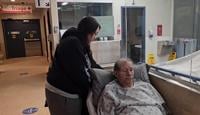MONTREAL - The family of a Cree elder who recently spent four days in a Montreal hospital hallway said Wednesday they hope sharing his experience might spur change for the treatment of patients in Quebec emergency rooms.
Matthew Mukash was transported to Montreal General Hospital from his home in the northern Quebec village of Whapmagoostui on Jan. 7 after health problems he had been dealing with since August got considerably worse, notably weight loss and mobility problems.
Mukash, 72, a former grand chief of the Grand Council of Crees in Quebec, received treatment but remained in the ER hallway after being admitted to hospital ã a common situation in Quebec's overtaxed emergency rooms.
"When I was first admitted I was placed in a room. I spent one night there," Mukash said in a video recorded on Jan. 10 in the hospital by his son and translated from Cree. "I was then asked to leave the room, so I was rolled out ... I was placed here right at the entrance. Iãm still here."
He said he was just metres from people who were intoxicated and aggressive. There were many sleepless nights and one night, his granddaughter Jade, who had accompanied him from the north, was allegedly told by security she couldn't sit in the hallway with him.
Jade Mukash said her grandfather is still recovering from the experience.
"I knew what to prepare for, but I didn't know that we would be in a lobby for four days," she said in an interview. "Especially while you're watching your loved ones going through a health issue. You know, it's a lot of stress and a lot of heartbreak."
Matthew Mukash's son, Pakesso, who lives in Montreal, said the family had hoped after each test or scan that his father would be taken to a room for privacy and comfort. The son even offered to take his father home and bring him back but was told he'd lose his priority.
The emergency room network across the province has been overwhelmed in recent weeks, a situation the health minister said recently is expected to persist for much of the winter.
In a statement, the McGill University Health Centre ã which includes the Montreal General ã said it couldn't comment on specific cases. But it said emergency department overcrowding is due to staff shortages and an unprecedented number of patients waiting to be transferred to other wards.
The hospital said it has been working for several months to improve co-ordination and patient flow, reducing the average length of stay and offering alternatives to the ER for less seriously ill patients.
"We recognize that all establishments in the health-care network are going through difficult times, and the MUHC is no exception," it wrote. "This unfortunate situation has an impact on our patients and their families."
Pakesso Mukash said he hopes his father's experience is a wake-up call for better treatment for all Quebec patients, including those from Cree and Inuit communities who travel great distances and deal with language and cultural barriers while accessing care.
"So my dad's story becomes kind of like the people's story, so hopefully something nudges somewhere that this needs to change, not just for Indigenous people," Pakesso Mukash said.
According to the Index Santûˋ website, emergency departments across the province were averaging 125 per cent capacity on Wednesday afternoon.
One advocate for patient rights said better home care for seniors and outpatient care is key. Doctors visiting seniors at home diminishes their need for hospitalization by half, Paul Brunet said.
Jade Mukash said her grandfather's experience shines a light on a larger problem.
"It wasn't that we expected him to have special care or to be treated better than anybody else, we just expected, you know, the compassion that any other patient should have," she said.
This report by üСÜꪤüýò¿Øéóæòêü was first published Jan. 17, 2024.








































